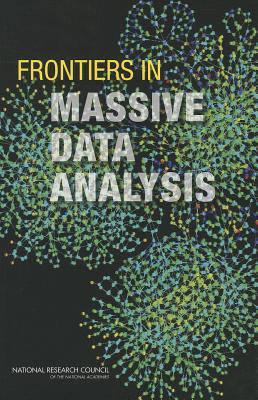
- Afhalen na 1 uur in een winkel met voorraad
- Gratis thuislevering in België vanaf € 30
- Ruim aanbod met 7 miljoen producten
- Afhalen na 1 uur in een winkel met voorraad
- Gratis thuislevering in België vanaf € 30
- Ruim aanbod met 7 miljoen producten
Frontiers in Massive Data Analysis
National Research Council, Division on Engineering and Physical Sciences, Board on Mathematical Sciences and Their Applications, Committee on Applied and Theoretical Statistics, Committee on the Analysis of Massive DataOmschrijving
Data mining of massive data sets is transforming the way we think about crisis response, marketing, entertainment, cybersecurity and national intelligence. Collections of documents, images, videos, and networks are being thought of not merely as bit strings to be stored, indexed, and retrieved, but as potential sources of discovery and knowledge, requiring sophisticated analysis techniques that go far beyond classical indexing and keyword counting, aiming to find relational and semantic interpretations of the phenomena underlying the data.
Frontiers in Massive Data Analysis examines the frontier of analyzing massive amounts of data, whether in a static database or streaming through a system. Data at that scale--terabytes and petabytes--is increasingly common in science (e.g., particle physics, remote sensing, genomics), Internet commerce, business analytics, national security, communications, and elsewhere. The tools that work to infer knowledge from data at smaller scales do not necessarily work, or work well, at such massive scale. New tools, skills, and approaches are necessary, and this report identifies many of them, plus promising research directions to explore. Frontiers in Massive Data Analysis discusses pitfalls in trying to infer knowledge from massive data, and it characterizes seven major classes of computation that are common in the analysis of massive data. Overall, this report illustrates the cross-disciplinary knowledge--from computer science, statistics, machine learning, and application disciplines--that must be brought to bear to make useful inferences from massive data.
Specificaties
Betrokkenen
- Auteur(s):
- Uitgeverij:
Inhoud
- Aantal bladzijden:
- 190
- Taal:
- Engels
Eigenschappen
- Productcode (EAN):
- 9780309287784
- Verschijningsdatum:
- 3/10/2013
- Uitvoering:
- Paperback
- Formaat:
- Trade paperback (VS)
- Afmetingen:
- 152 mm x 226 mm
- Gewicht:
- 317 g

Alleen bij Standaard Boekhandel
Beoordelingen
We publiceren alleen reviews die voldoen aan de voorwaarden voor reviews. Bekijk onze voorwaarden voor reviews.











